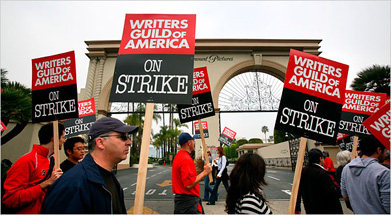Top 12 Film Industry Stories of 2007: #1:
Writers Strike, Hollywood Braces for Later Impact
By David Mumpower
January 1, 2008
Rare is the industry story so far reaching that we know ahead of time that it is likely to repeat its entry on the list at a later date. Such is the scenario here. The impact of the writer's strike has been to date reserved largely for television programming. These are the types of entertainment avenues that have a tight production schedule requiring them very little advance planning. A strike by writers, actors or the like creates a much quicker period of disruption as demonstrated by the fact that several high profile programs such as The Office are already out of new episodic content. Conversely, feature films require a substantially longer 12-18 month window for the most part with some special effects-laden productions taking even longer than that. What this means is that we have only scratched the surface of how the strike will impact the industry. But the early ripples are more than enough to forecast a tidal wave in the offing.
Where do we stand on the issue? Alas, BOP itself is not above the fray here. We have a couple of studio execs as well as multiple members of the Writer's Guild on our staff. This makes the entire subject touchy enough that we generally do not discuss it for fear of a civil war erupting that would rival our previously most controversial subjects, chili recipes and the Ryder Cup (don't ask). Any attempt to discuss the issue requires us to speak in the most neutral terms for fear of alienating one of our own. The matter is just that laden with pitfalls.
Here is what is not up for debate. On November 5, 2007, Hollywood writers who were members of the Writer's Guild laid down their laptops and grabbed picket signs instead. They drove to the buildings where they went to work every morning, only this time they did not go in. Instead, they began to pace outside, showing their signs to bemused passersby. These scribes no longer felt they could in good conscience enter the buildings where their pay scale was not considered to be in line with the amount of revenue earned by the sweat of their brow.
Last ditch efforts to forego the situation had failed, and all later attempts to curtail the matter were also inadequate, save for one independent negotiation between David Letterman's company, Worldwide Pants, and the writers for the shows he controls, Late Night with David Letterman and The Late, Late Show with Craig Ferguson. Everyone not impacted by this discussion remains on strike with no settlement in the offing. The Writer's Strike of 2007 appears ready to last well into 2008.
How did we get to this point? That would depend upon whom you ask. The key sticking point is the same as the strike of 1988, residuals. The difference lies in the advances in technology since then. We'll examine the why of that later on. First, we should point out why members of the guild are determined to avoid history repeating itself. The 1988's strike was predicated upon the argument regarding how a writer should be financially compensated from corporate revenue resulting from VHS tapes. At the time, such titles were not priced to sell, meaning that when video store chains such as Blockbuster made purchases, they were generally paying in the range of $50 or more. MSRP on these titles was frequently near $100 for any consumer not buying in bulk who attempted to make a purchase.
Continued:
1
2
3
4
5
|
|
|
|

![]() Tweet
Tweet
![]() Print this column
Print this column



